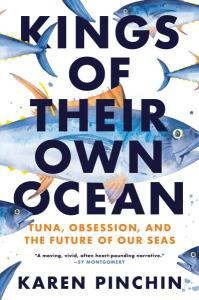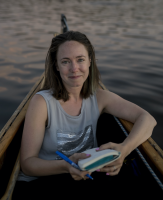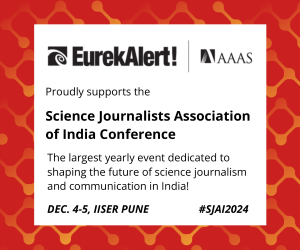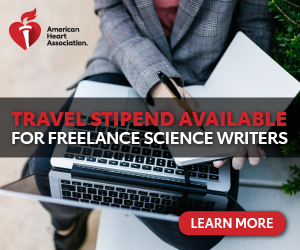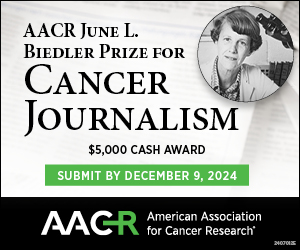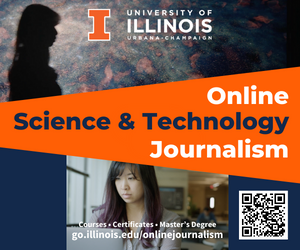
Karen Pinchin—Kings of Their Own Ocean: Tuna, Obsession, and the Future of Our Seas
TUNA, OBSESSION, AND THE FUTURE OF OUR SEAS
Karen Pinchin
Dutton, July 18, 2023
Hardback $30, Kindle $15.99, audiobook $5.95
ISBN-10: 0593471474, ISBN-13: 978-0593471470
Kindle ASIN: B0BJPC96CM, audiobook ASIN: B0BL8WWXQ1
Pinchin reports:
I never planned to write a book about a fish. But that was before I heard about Amelia, a giant female bluefin tuna killed off Portugal’s southern coast in 2018, whose existence encapsulated so many pressing issues and struggles in our own complex world.
Before Amelia's death — she was killed by a scuba diver wielding a lupara, an exploding cartridge attached to a long pole — she had been marked by humans twice. The first time, in 2004, an obsessive Rhode Island fisherman named Capt. Al Anderson lodged a plastic tag in her back. The second time, in 2007, scientist Molly Lutcavage used a high-tech pop-up satellite tag.
I first discovered Amelia via a call from Lutcavage: she was ecstatic, while I was mostly confused. But as I learned more about Anderson, who reminded me of my own mercurial father, their entwined stories felt undeniable.My publishing experience was very lucky! I took Prof. Sam Freedman’s book-writing class at Columbia University while earning a Master's degree in science journalism, and eventually won the Lynton Award for my book proposal. That led to my signing with my incredible agent, Mackenzie Brady Watson.
Logistically, I doubled up reporting in Japan while working on my graduate thesis on American eel and poked away at my proposal while working at PBS FRONTLINE before and during the pandemic. I travelled widely for reporting and had the book fact-checked thanks to generous grants from the Canada Council for the Arts and the Sloan Foundation. My wonderful writing group came out of my time at Columbia, and I recommend aspiring writers of non-fiction fight to find their community. Writing a book is hard, lonely and alienating, but mine has also been the culmination of a dream. Both are true!
After COVID hit, my family ended up in Halifax, Nova Scotia, a few hours from where U.S. fishermen flocked during the giant gamefish craze of the 1930s. The chapter inspired by that period is one of my favorites, and is a good lesson to trust yourself and the process.
Contact info:
- Karen Pinchin, kap2216@columbia.edu, https://www.karenpinchin.com/
- Book: Kings of Their Own Ocean: Tuna, Obsession and the Future of Our Seas
- Publicist: Emily Canders, ecanders@penguinrandomhouse.com
- Agent: Mackenzie Brady Watson, mbw@skagency.com
NASW members: will your book be published soon? Promote it by submitting your report for Advance Copy.
Tell your fellow NASW members how you came up with the idea for your book, developed a proposal, found an agent and publisher, funded and conducted research, and put the book together. Include what you wish you had known before you began working on your book, or had done differently.
See https://www.nasw.org/advance-copy-submission-guidelines.
View Advance Copy archives at https://www.nasw.org/member-article/advance-copy.
Thinking of writing a book? If you are a NASW member, you may access a list of more than 200 books and online resources to help you craft your book proposal, find an agent and funding sources, negotiate your contract, learn about self-publishing, publicize and market your book, and more at https://www.nasw.org/article/write-book.
View the recording of a recent Advance Copy Virtual Business Chat, A Primer for Authors on Book Publicity. NASW member login required.
Send book info and questions about book publishing to Lynne Lamberg, NASW book editor, llamberg@nasw.org.
Follow @LynneLamberg on Twitter for news about science/medical books, writing, and NASW authors.
Banner image adapted from original photo by Karen Pinchin.
Advance Copy
The path from idea to book may take myriad routes. The Advance Copy column, started in 2000 by NASW volunteer book editor Lynne Lamberg, features NASW authors telling the stories behind their books. Authors are asked to report how they got their idea, honed it into a proposal, found an agent and a publisher, funded and conducted their research, and organized their writing process. They also are asked to share what they wish they’d known when they started or would do differently next time, and what advice they can offer aspiring authors. Lamberg edits the authors’ answers to produce the Advance Copy reports.
NASW members: Will your book be published soon? Visit www.nasw.org/advance-copy-submission-guidelines for information on submitting your report.
Publication of NASW author reports in Advance Copy does not constitute NASW's endorsement of any publication or the ideas, values, or material contained within or espoused by authors or their books. We hope this column stimulates productive discussions on important topics now and in the future as both science and societies progress. We welcome your discussion in the comments section below.
